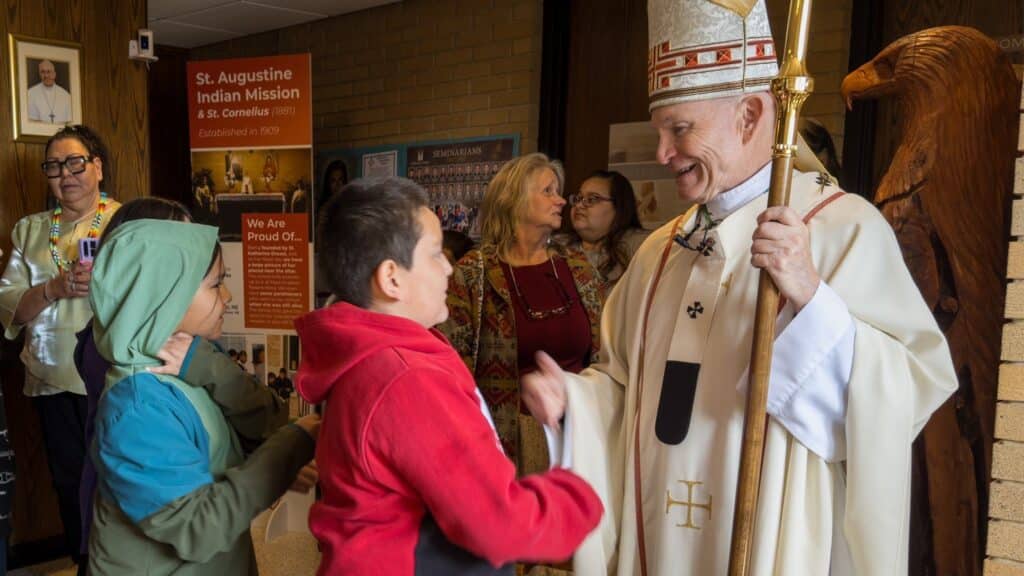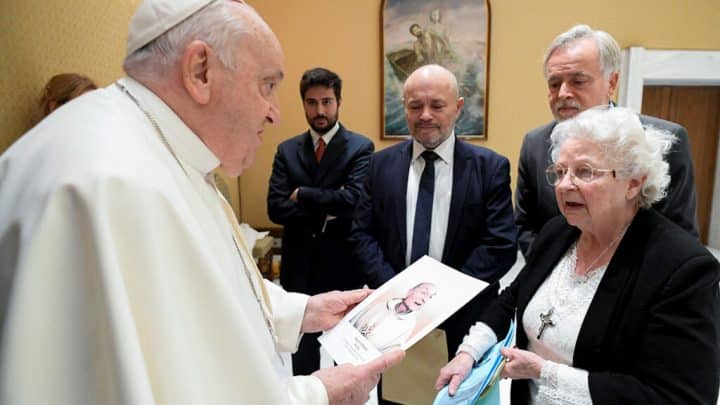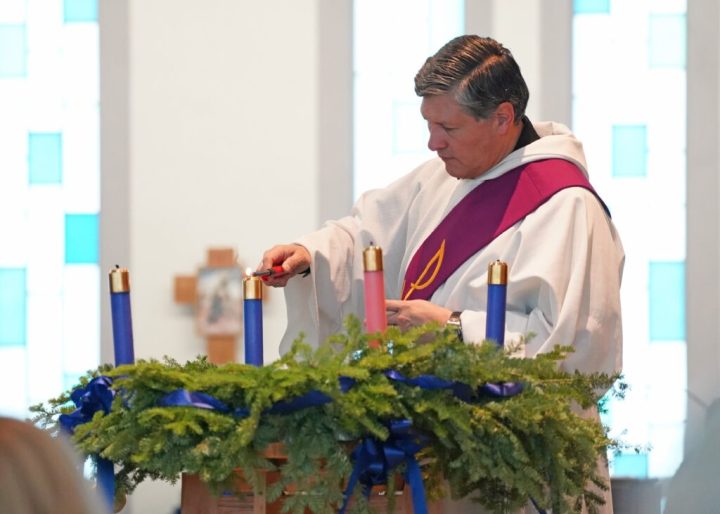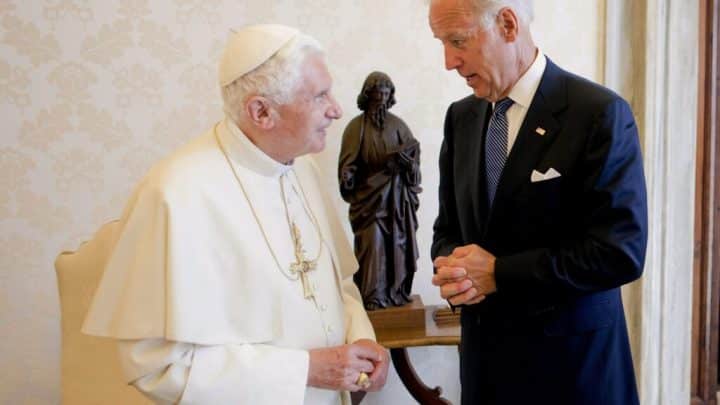
Born in Saint Louis, Missouri, George Lucas was appointed Archbishop of Omaha by Pope Benedict XVI in 2009, after serving as Bishop of Springfield in Illinois for almost 10 years. Since then, he has become a proud “Cornhusker.” Archbishop Lucas was ordained to the priesthood in the Archdiocese of St. Louis in 1975, after studies at Kenrick-Glennon Seminary. Discerning his vocation early, he attended a high school seminary before entering major seminary, where he says he became serious about prayer. During his years as a priest in St. Louis, he earned a master’s in history from St. Louis University and served in a variety of pastoral assignments, including as rector of Kenrick-Glennon Seminary.
Charlie Camosy: How did you discern your call to the priesthood? Did anything about that experience give you insight into how to recognize and cultivate God’s call to others during your time as bishop in Springfield and Omaha?
Bishop George Lucas: My parents were introduced to each other by a priest. It was clear that they had a great deal of affection for him. We were blessed with good parish priests who cared about our family and were present in the school and at other activities. I had thoughts about being a priest and was encouraged to enter the high school seminary when I finished eighth grade in 1963. I enjoyed the seminary, made good friends and my sense of the call to the priesthood was sometimes strong, sometimes confusing during high school and college.
A crucial moment for more mature discernment came when I entered major seminary at the age of 22. Even though I had no trouble fulfilling the seminary’s requirements, I realized that I wasn’t praying often enough or well enough. I knew that it was going to be necessary to do something about this or leave the seminary. Happily, I connected with just the right spiritual director. He introduced me to a type of contemplative prayer, and he insisted that I give time to it every day, in the chapel, before the Blessed Sacrament. There I began to grow confident of the Lord’s presence and of his desires for my life.
To your question, my own experience then and since leads me to encourage young Catholics to look for Jesus in quiet prayer as they discern their own vocation. They need to be led to this experience and encouraged in it. I am happy to see that more and more in our high schools, youth activities and campus ministry quiet prayer before the Blessed Sacrament is offered. Many other supports are needed as one discerns a call to the priesthood or any other vocation. It is no surprise that it begins and is sustained by a personal relationship with Jesus, which he offers us in prayer.
Camosy: Priests are under varied pressures that can threaten to pull them away from what first drew them to the priesthood. How does a bishop navigate this?
Bishop Lucas: I think of the demands of administration. For priests and bishops the details of finance, personnel, safe-environment, communication, pastoral planning, and civil and canon law can seem all-consuming, and we ignore them at our peril. Thankfully, the church is blessed with many competent and generous people with gifts in these areas who are ready to collaborate with us. I pray with my co-workers, learn from them and enjoy seeing the Holy Spirit at work in the tasks we face together.
I have found other sources of joy and encouragement in my life and ministry. Sometimes they are surprises; usually they come as the result of planning. I give the first part of the day to the Lord in prayer. The whole day belongs to him anyway, and he gives me the day to share in his mission. I benefit from regular spiritual direction and confession, retreats and the support of family and friends. Spending the weekend in parishes for pastoral visits is always a source of joy and encouragement. I have participated in many listening sessions — for the articulation of our pastoral vision, and to gain insight into the lives and challenges of immigrants and refugees. I have especially appreciated the initiative taken by the priests of the archdiocese to reshape our parishes for mission, while balancing the immediate daily needs of the parish.
Camosy: You have an advanced degree in history. Our culture’s lack of historical appreciation is well known, but even many highly educated folks are convinced that we live in a uniquely uninformed era, especially in the history of the church. How can engaging with and studying the past help put the real challenges we are facing right now into some kind of perspective?
Bishop Lucas: I agree that it is easy to lose perspective about real current challenges without a good knowledge of history. We also suffer from a lack of knowledge of the Bible; that leads to a loss of faith, which is more basic. Christians should study the Scriptures along with history — then we learn to name current evils and blessings. We become confident that God has not given up on humanity. And we are reminded of the unique event of Jesus Christ.
It is easy to feel that we are singularly beset by current troubles because we have lost the impulse to evangelize. Pope Francis and his immediate predecessors have seen the centrality of evangelization, from a biblical and historical perspective. I feel like many of us are resisting this view. We settle for a snippet of history that tells us that when things get really bad, God will raise up great saints to set things right. Who do we think we are waiting for? Jesus sends us into the world to have an influence now, not in some past or future time. We are enlivened by the same Holy Spirit that sent the first disciples of Jesus into the world, with personal abandon, on a spiritual and temporal adventure that changed human history.
Camosy: What does Archbishop Lucas do for fun? Music? Mindless TV? Sports? Arts?
Bishop Lucas: I enjoy being outdoors, riding my bicycle and walking. I read biographies of significant historical figures, and I am currently hooked on the podcast “The Rest is History.” Having grown up in St. Louis, I am proud to be a Cardinals fan — we are not having a proud season. And like others who have moved to Nebraska, I have participated in the RCIA — the Rite of Cornhusker Initiation for Adults.
Camosy: I’m sure no one ever comments on the fact that you are named George Lucas. Am I right?
Wrong. I have learned to live with being “the other” George Lucas. I am happy to have been named after my father, who was named for his grandfather. We have owned the name for a long, long time, but only in this galaxy, as far as I know.
– – –
Charlie Camosy is professor of medical humanities at the Creighton School of Medicine in Omaha, Nebraska, and moral theology fellow at St. Joseph Seminary in New York.




